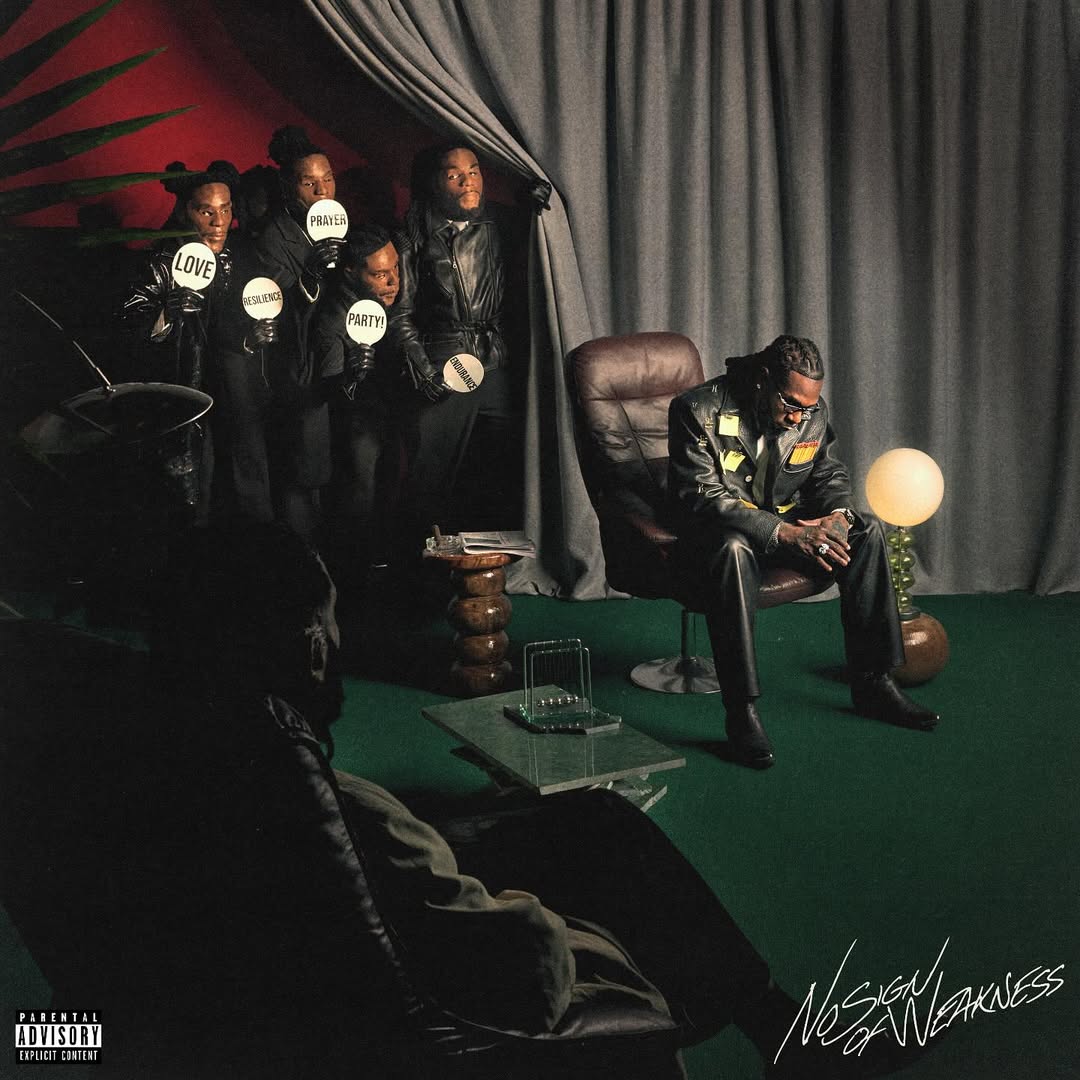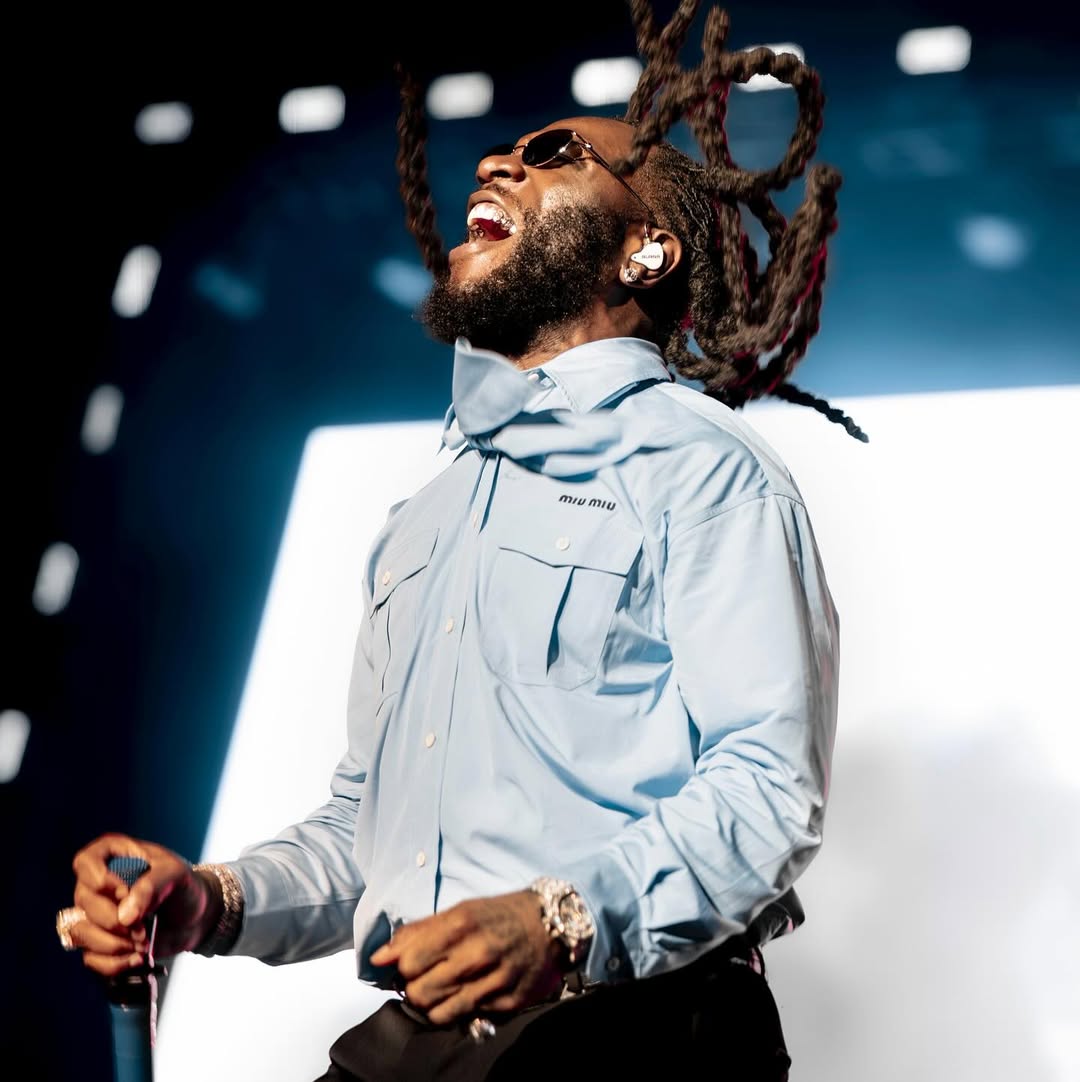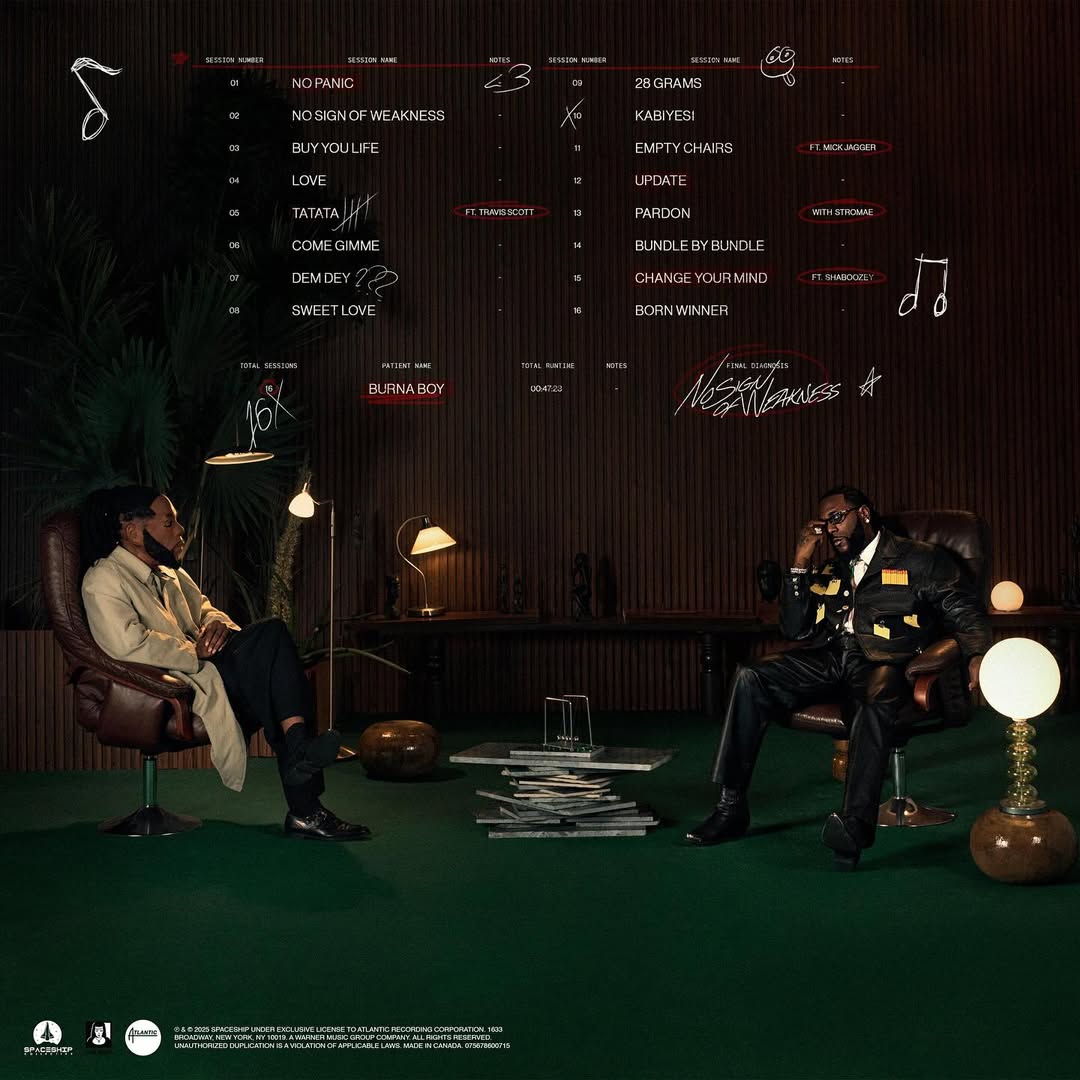Burna Boy will always exude creativity, but on No Sign of Weakness, the boundaries he pushes feel less like instinctive artistic leaps and more like deliberate crossover plays.
By Afrocritik’s Music Board
With over a decade as one of Afro-Pop’s most versatile and incisive acts, Burna Boy has often framed his albums around proving a point. Since releasing African Giant in 2019—the Grammy-nominated album that eventually lost to Angelique Kidjo at the 2020 awards—Burna Boy has used every project, including 2023’s I Told Them…, as a deliberate reminder of his skill, ambition, and perceived peerlessness.
The lone exception to this pattern was his sixth studio album, Love, Damini, a coming-of-age album marked by introspection and vulnerability that is more focused on reflection than on proving anything. But with his eighth studio album, No Sign of Weakness, Burna Boy returns to familiar ground: chest out, ready to remind everyone exactly who he is.
For fans who have followed Burna Boy from the very beginning, his global takeover always felt inevitable. Many might point to the 2018 Outside era as the pivot that kicked his career into full throttle, but the prophecy came much earlier.
On the intro to his 2013 debut album, L.I.F.E, a recorded message from his grandfather and veteran music critic, Benson Idonije, offered a striking premonition: “And his music is unique. Even though [it is in the] Hip-Hop region, the good thing about his music is that it leans to jazz and other roots. And so he has a long way. He has something good”.
That early moment offered a glimpse into Burna’s artistic DNA as a genre-blurring fusionist, while also serving as a thoughtful acknowledgement of an artiste still in formation and a subtle nod to the fearless innovator he would grow into. No Sign of Weakness, like many of the albums before it, is another attempt to stretch that prophecy even further—and to prove that, even after many years existing in the rarefied air of global superstardom, Burna Boy shows no sign of slowing down or being relegated.

True to the spirit of the album’s title, Burna Boy doesn’t ease in with his usual reflective tone. Instead, he opens No Sign of Weakness with a burst of angst and braggadocio on “No Panic”. Over a menacing beat, he declares, “Get everything pass all of them/ No know who dey gas all of them/ Me I just dey laugh all of them”. The hook leans into familiar pop culture lingo—“Them dey whine me, I no panic/ Me, I no panic”—to reinforce his stance of unbothered dominance. And in the second verse, he addresses the rumours of a kidnapping allegation, only to dismiss it with the same dismissive jab: “Them say I kidnap one of them/ But I just dey laugh all of them”.
He extends his message of showing no weakness on the intro of the titular track, “No Sign of Weakness”, which samples Ghostface Killah’s 2000 song, “Mighty Healthy”. A heavily processed voice opens the track with a reflective warning: “Weakness does not need permission to take over your life. It only needs space. And every time you choose comfort over challenge…” From there, Burna Boy launches into a gritty rap flow, doubling down on self-belief and throwing jabs at detractors.
The highlife rhythm and melodic guitar intro of “Buy You Life” recalls the tenderness of “Onyeka” from Twice As Tall. But here, Burna Boy trades romance for reflection. It’s one of the album’s deeper messages, built around a cautionary chorus: “You dey chase this money all your life/ All the money no fit buy you life”. The track blends soft, danceable instrumentation with a hard truth that wealth means little without purpose or peace.
On the Dre Skull–produced mid-tempo track “Love”, one might expect a romantic ballad, but Burna Boy flips the script. He delivers a meditation on loyalty and reciprocity. “No go dey live your life to impress anybody/ ‘Cause some people worse pass Satan/ Na who love me I go love/ Na who love us we go love”, he sings on the first verse. The message lands firmly, riding a steady bassline that keeps the groove alive even as the lyrics get personal.
Tapping into the wave of Brazilian funk exploration currently sweeping through Afrobeats, Burna Boy teams up with rapper, Travis Scott, on the pre-released, funk-powered sensual track “TaTaTa”. The title itself is an onomatopoeic slang term for sex that sets the tone for a record that thrives on hedonism.
Travis Scott brings an energised rap delivery, while Burna leans fully into the track’s provocative edge. In a nod to internet virality, he name-drops Baltasar Engonga—the Equatorial Guinean who went viral after explicit sex videos of him and multiple women surfaced, singing “Badder than Baltasar Engonga” as a reference to ground the song in the explicit and chaotic energy it aims to channel. That same sensual energy carries over to “Come Gimme”, structured as a flirtatious conversation between Burna Boy and a love interest as they set the stage for a private rendezvous.
The high-energy “Dem Dey” is a flipped version of a freestyle Burna Boy once delivered as a tongue-in-cheek response to popular socialite Sophia Egbeju, following a trending scandal. The track interpolates Lagbaja’s 2000 classic “Gra Gra”, pairing Burna’s chest-thumping delivery with a pulsating, danceable beat.
With less of the emotive pull that typically defines his love songs, Burna Boy stretches the boundaries of his sound on the reggae-tinged ballad “Sweet Love”. On “28 Grams”, he channels the rhythmic spirit of early-2000s Danfo Drivers to craft a stoner’s anthem, a continuation of his weed-themed streak, following tracks like “Rizzla” and “Smoke Some Weed”.
The EDM-inflected “Kabiyesi” leans more into vibe than lyricism. He brags on the chorus, “I never sing one million song, still no go talk finish”, but mostly cruises through the track with little lyrical depth.

The album finds one of its most captivating moments in “Empty Chairs”, a track Burna Boy had previously teased at one of his concerts. Featuring the legendary Rolling Stones frontman, Mick Jagger, the song blends rock and Afro-Fusion in unexpected ways, even though its chorus slightly disrupts the track’s flow.
Still, the message comes through in two powerful parts. On the first verse, he asserts his dominance with lines like, “You might think that you’re sitting on a throne/ But to me, it’s just an empty chair/ And that’s my icy glare/ Last time I checked, there was nobody there/ Took my place without fare”, reclaiming his status as king. Then, in the second verse, he shifts the meaning of ‘empty chairs’, by addressing online critics who question the turnout at his concerts: “My enemies are no longer on the street or the roads/ Now they’re on the internet or the blogs/ And in my sold-out shows looking for empty chairs”. It’s a clever lyrical double entendre that displays his in-depth songwriting skills.
The pre-released “Update” samples Soul II Soul’s 1989 British R&B classic “Back to Life (However Do You Want It)”, and continues Burna Boy’s chest-thumping streak. “On a normal day, dem no fit touch my energy”, he declares in the opening line, setting the tone for another anthem of self-assurance. On the sultry “Pardon”, he teams up with Belgian singer and rapper, Stromae, gliding smoothly over the production as Stromae takes the lead with ease.
Burna Boy returns to familiar boasting on “Bundle by Bundle”, a log-drum-laden track where he flexes his wealth with rhythmic precision. But things take a softer turn on “Change Your Mind”, a heartfelt Afro-Country ballad featuring American Country-Rock artiste, Shaboozey. With gentle guitar licks and a soaring chorus—“When the love runs out and the lights go off/ Wanna leave this on a high/ I’m hoping I can change your mind”—the track offers one of the album’s most emotionally resonant moments.
In what has become a typical Burna Boy outro, “Born Winner” closes the album on a reflective note. The track is framed by the voice of a preacher, who delivers motivational words in both the intro and outro: “You are born to be great, self-talk matters. Eternal talk with eternal significance is very important. Never say to yourself, ‘I am confused, I am a loser’. No. But say to yourself what God says about you”.
Between these affirmations, Burna Boy delivers a fiery verse that retraces his journey—from the struggle to the spotlight—and cements his self-image as an unstoppable force. It’s a fitting end to an album that seeks to silence doubt and reinforce legacy.
Given who Burna Boy is and the level he operates at, it’s no surprise that the engineering on this project is nothing short of elite. His access to the highest echelons of studio craftsmanship shines in the detail.
One of the constants across Burna Boy’s discography, and particularly evident on No Sign of Weakness, is the steadiness of his vocal delivery. Whether he’s coasting over the booming beat of “TaTaTa”, relaxing into the lilt of “Buy You Life”, slipping into the soft curves of a ballad like “Change Your Mind”, or dipping into the gruffness of “Bundle by Bundle”, his voice remains measured and assured. It never feels rushed or overexerted; instead, his deep, resonant timbre fills every track with ease and control, acting as the connective tissue that ties the album’s shifting sonic palettes together.
Even when the production swells into a barrage of heavy frequencies, Burna Boy’s vocals stay crystalline—present without being forcibly spotlighted, cutting through without competing for space. Backing vocals, ad-libs, and sampled snippets, whether pulled from archival speeches, old records, or found online, are all treated with intention, finding their place in the mix without disrupting its balance.
This cohesion, maintained across material recorded in different studios by various hands, is a testament to the high-level engineering at play. Every element, especially Burna’s vocal presence, feels like it belongs in the same carefully sculpted sonic world.
In terms of sequencing, however, No Sign of Weakness experiences some unevenness, particularly in its first half. The opening run, while energetic and assertive, sometimes feels loosely stitched, with abrupt stylistic pivots that don’t always transition smoothly. Tracks like “No Panic” and “No Sign of Weakness” set a combative, chest-thumping tone, but as the album progresses into “Buy You Life” and “Love,” the shift towards introspection lacks connective tissue, making the listening journey feel slightly fragmented. There’s a sense that the “Big 7” crooner is ticking off thematic boxes: dominance, wealth, self-assurance, social commentary, but without a fully cohesive narrative thread tying them together in the early half.

Fortunately, No Sign of Weakness’ second half fares much better. The latter tracks flow with a natural ease that the opening section lacks, benefiting from smoother transitions both thematically and sonically. From “Sweet Love” through to the emotionally rich “Change Your Mind” and the reflective closer “Born Winner,” Burna Boy crafts a sequence that feels more deliberate and immersive. The track progression in this portion of the album allows moods to build and evolve rather than shift abruptly.
Production-wise, it’s a complex terrain. The need to speak to a global audience, combined with Burna Boy’s own flexible curiosity, stretches the soundscape across multiple styles. The album moves from Afrobeats into Baile Funk, Reggae, R&B, Hip-Hop, and even hints at Rock.
The genre-blending mostly works, not because of overbuilt beats but because Burna’s voice does the lion’s share of the emotive and melodic heavy lifting. The producers know when to lean back and give him space. But that same restraint sometimes drifts into undercooked territory, where certain beats feel more like sketches than completed works.
There are moments where the production lacks the fullness or dynamism needed to match the energy of Burna’s performance. Still, when it hits, it hits with force and clarity. The standout moments linger, while the more subdued ones are carried by Burna Boy’s charisma and songwriting.
Altogether, it results in a listening experience that feels deeply polished and technically impressive, but also a touch mechanical. There is a sense of careful construction throughout, an intentionality that prioritises reach and resonance over risk and raw experimentation.
Burna Boy will always exude creativity, his skill as a performer and writer too innate to dim, but here more than on previous projects, the boundaries he pushes feel less like instinctive artistic leaps and more like deliberate crossover plays.
This tension, while present, doesn’t erase the album’s core pleasures. It still bursts with energy and flair. It still thrums with the bravado, vibrance, and emotional voltage we expect from a Burna album. It might have fewer peaks than we’ve come to anticipate, but the broader landscape remains rich, engaging, and wildly enjoyable. Even if there are fewer moments of pure astonishment, there are still barely any skips.
Lyricism – 1.6
Tracklisting – 1.2
Sound Engineering – 1.6
Vocalisation – 1.4
Listening Experience – 1.4
Rating – 7.2/10
Abioye Damilare Samson is a music journalist and culture writer focused on the African entertainment industry. His works have appeared in Afrocritik, Republic NG, NATIVE Mag, Culture Custodian, and more. Connect with him on Twitter and IG: @Dreyschronicle.
Yinoluwa “Yinoluu” Olowofoyeku is a multi-disciplinary artist and creative who finds expression in various media. His music can be found across all platforms and he welcomes interaction on his social media @Yinoluu.
Emmanuel ‘Waziri’ Okoro is a content writer and journo with an insatiable knack for African music and pop culture, with bylines on Afrocritik, PM News Nigeria, Tribune, ThisDay Live, Vanguard, and The Guardian, amongst others. When he’s not writing, you will find him arguing why Arsenal FC is the best football club in the multiverse. Connect with him on Twitter, Instagram, and Threads: @BughiLorde.




